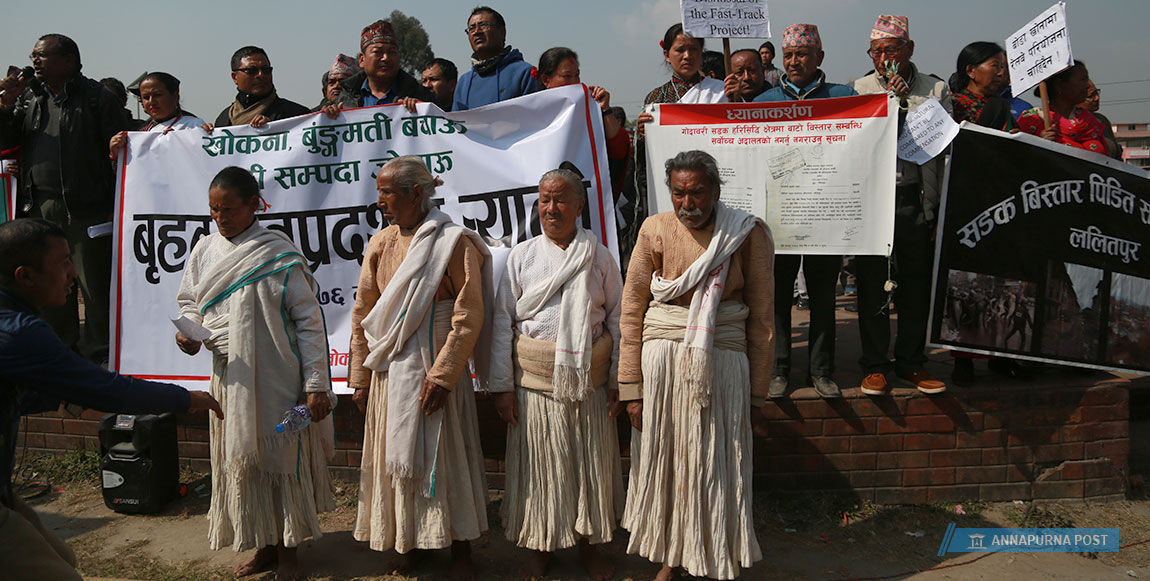1 December 2020, Kathmandu
Indigenous Newar communities – affected by the Kathmandu-Terai/Madhesh Fast Track (Expressway) Project and other ongoing or planned infrastructure and urbanization projects in historical settlements of Khokana and Bungamati in the south of Nepal’s capital city, Kathmandu – have called on two UN experts in Geneva to take prompt actions for safeguarding their rights against the serious threats of displacement of the communities, violations of their land and resource rights as well as cultural rights and other impacts on them due to the ill-planned projects.
In separate letters sent today to the UN Special Rapporteurs on the rights of indigenous peoples and in the field of cultural rights, two local groups (Janasarokar Samiti of Khokana and Bungamati) representing the affected communities have urged the Rapporteurs to jointly examine the information submitted and correspond with the Government of Nepal to protect and promote the rights of the indigenous communities to their lands, resources, sacred places and culture in the context of those projects. As stated in the letters, besides the Fast Track Expressway, other ongoing or planned projects, including Bagmati River Basin Improvement Project (Bagmati Corridor), Kathmandu Outer Ring Road and Thankot-Bhaktapur Transmission Line Project and one of the four “Smart Cities” proposed in Kathmandu valley, will entirely displace the indigenous communities from the historical settlements. Asian Development Bank has directly or indirectly supported many of those projects.
The groups have requested that the Special Rapporteurs write to the Government to
- immediately halt the ongoing construction of the Fast Track Expressway and revise its alignment to preserve the arable and communal (Guthi) lands as well as historical and cultural sites in Khokana and Bungamati,
- remove the camp and other structures of the Nepal Army, which is assigned to construct the Expressway, installed in Khokana and return the occupied lands to the concerned landowners,
- ensure the right to peaceful assembly and freedom of expression of the affected communities to voice their concerns against the Fast Track Expressway and other projects and create an amicable space for meaningful dialogue on their concerns, and
- obtain the free, prior and informed consent of the affected communities for the Fast Track Expressway and other projects affecting their lands and resources.
Earlier, the groups had sent similar letters to the country offices of the International Labour Organization (ILO), UNESCO and the UN in Kathmandu. The representative of those offices had also undertaken field visits to Khokana and Bungamati to understand the concerns of the communities. However, the Government has not responded positively to the correspondence from those offices to facilitate a meaningful dialogue with the affected communities.
Over the years, the Khokana and Bungamati locals have organized various gatherings, protests and demonstrations to express their opposition to the various projects Those protests and demonstrations have often been responded with brutal police repression. In July, a clash erupted between protestors and police when the authorities intervened in a “paddy transplantation protest” organized in Khokana at the proposed zero point of the Fast Track. Over a dozen protestors were injured when police lobbed tear gas shells and charged batons while four police personnel were also injured. Recently, on an almost daily basis, the locals engage in heated arguments with the sub-contractors of the Fast Track Expressway who seek to undertake construction in private & communal lands of the communities amidst prohibitory orders for the general public to stay indoors due to Covid-19 pandemic.
In February, more than fifty affected locals and communities’ representatives of Khokana and Bungamati had filed a writ petition at Nepal’s Supreme Court calling for the protection of the historical settlements and the communities therein against the multiple “development” projects. However, the Court has repeatedly postponed hearings on the petition while the construction of the Fast Track Project progresses continuously. In their letters to the Special Rapporteurs, the groups have alleged violations of their rights guaranteed in national and international laws, including the ILO Convention 169 and the UN Declaration on the Rights of Indigenous Peoples that apply to Nepal.
Click here to read the annex to the letters submitted to the Special Rapporteurs for more information.
For further details or inquiries, contact Janasarokar Samiti, Khokana at khokanajanasarokarsamiti@gmail.com.


 फास्ट ट्र्याक बनाउन सेनाले पुसदेखि नै जग्गा सीमांकन गर्न थालेको छ। स्थानीयले भोगचलन गर्दै आएको जग्गामा सरकारले उचित मुआब्जा वितरण नगरेको उपत्यका सडक विस्तारपीडित संघर्ष समितिका सुमन सयामी बताउँछन्। ‘सांस्कृतिक नगरी मास्ने र यहाँ (उपत्यका) का आदिवासीलाई उठीबास लगाउने सरकारको नीति छ,’ उनले भने, ‘सरकारको यस्तो दमन हामीलाई स्वीकार्य छैन।’ सरकारको निर्णयले पुस्तौंदेखि कृषि पेसामा निर्भर स्थानीय मर्कामा परेको उनले बताए।
फास्ट ट्र्याक बनाउन सेनाले पुसदेखि नै जग्गा सीमांकन गर्न थालेको छ। स्थानीयले भोगचलन गर्दै आएको जग्गामा सरकारले उचित मुआब्जा वितरण नगरेको उपत्यका सडक विस्तारपीडित संघर्ष समितिका सुमन सयामी बताउँछन्। ‘सांस्कृतिक नगरी मास्ने र यहाँ (उपत्यका) का आदिवासीलाई उठीबास लगाउने सरकारको नीति छ,’ उनले भने, ‘सरकारको यस्तो दमन हामीलाई स्वीकार्य छैन।’ सरकारको निर्णयले पुस्तौंदेखि कृषि पेसामा निर्भर स्थानीय मर्कामा परेको उनले बताए।